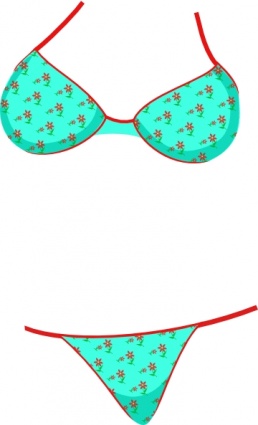Bikini bodies: Stop the madness

Spring is around the corner, and by the looks of all the store windows filled with bathing suits and cropped clothing, that can only mean one thing: it’s time to start working on that “bikini body.”
As this time of the year comes upon us, girls and women are expected to start eating well and getting in shape so they can restore their body back to beach-ready status.
But what really is a “bikini body?”
By societal standards, a bikini body consists of generically “hot” features such as big boobs, a flat stomach, nice curves, and toned legs and arms.
The bikini body is merely a social construct meant to make impressionable young girls and women feel insecure about their bodies. It all boils down to the idea that one’s body needs to be in a certain condition in order for this person to feel acceptable enough to go out in public.
Nobody should feel unprepared to go the beach once she has her bathing suit and sunscreen in hand. Nor should someone feel even a shred of abasement when looking at her reflection in a mirror.
According to Dosomething.org, approximately 91% of young women in America are unhappy with their bodies and resort to dieting to achieve their ideal body shape. In reality, only 5% of women naturally possess the body type often rendered by the media, and this select few weigh 23% less than the average woman.
The fact is every single body is beautiful just the way it is. A standard has been made by society that all women should have the lithe and ageless bodies of models seen in magazines. Even those women (excluding Victoria Secret Angels, who are biological miracles in themselves) don’t have the kinds of bodies that are Photoshopped to their heads.
Numerous celebrities who are known for their looks, Keira Knightley, Lorde, Kate Winslet, and Ashley Benson to name a few, have spoken out against Photoshopping in magazines and advertisements. After being photographed, these women look forward to seeing their faces and bodies on the final print. Instead, they find airbrushed and slimmed-down alien-like versions of themselves.
Due to the fact that the people who are primarily portrayed in media-based images don’t resemble the faces in their photos, no woman should set herself the standard to look that way.
As of this month, France has taken its own measures to promote healthy body images in the media. The country has done so by joining Spain, Israel, and Italy in banning the hiring of excessively skinny models. As revealed by TIME Magazine, this newly-passed bill states that any fashion agency discovered using models with a BMI under 18, which is approximately 121 pounds for a 5 ft., 7 in. model, could face up to six months of jail time and a fine of 75,000 euros ($82,000).
The bill also requires models to provide a medical certificate vouching for what the French government deems a healthy BMI.
A Kaiser Foundation study conducted by Nancy Signorielli found that one in every three articles (37%) in leading teen girl magazines includes a focus on appearance, and most of the advertisements (50%) use an appeal to beauty to sell their products.
If everyone were to look like a machine-made Barbie doll, then there would be no standard of beauty. Because of this, people need to learn to embrace the bodies that they were born with, including the traits that they don’t think fit into society’s standard of “beautiful.”
Take it from Gisele Bündchen, arguably the world’s most powerful fashion model who has faced her own fair share of airbrushing. “Our imperfections are what makes us unique and beautiful,” she said.
Ultimately, if the myth of the bikini body is allowed to continue permeating the minds of today’s youths, it will only be a matter of time until we are faced with new weight-conscious ideologies like a Going to the Park Diet.
Getting a bikini body is surprisingly easily and it can be achieved in two easy steps (none of which include buying a gym membership!):
- Pick out a bikini.
- Put it on your body.







Nicole Sheahan • Apr 27, 2015 at 11:15 am
This is such an important topic. Thank you for bringing it forward at the time when so many females start dreading this season that puts the magnifying glass to our bodies.
Here’s the URL of a NPR story about an 8th grader who started a campaign that led to Seventeen magazine’s pledge to not photoshop images of the young women: http://www.npr.org/blogs/thetwo-way/2012/07/05/156342683/seventeen-magazine-takes-no-photoshop-pledge-after-8th-graders-campaign